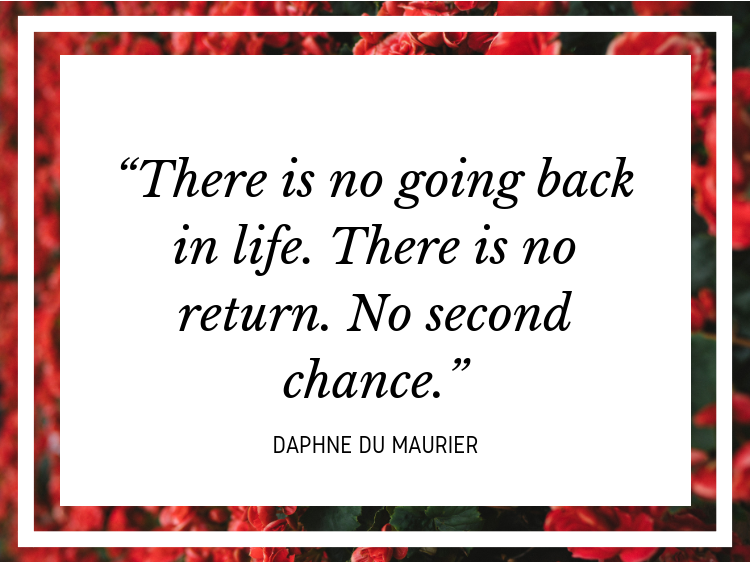Unconventional Mentor no. 20 - Daphne du Maurier
“There is no going back in life. There is no return. No second chance.”
Quote: “There is no going back in life. There is no return. No second chance.” - Daphne du Maurier
I don’t remember if it was Rebecca or The Birds that I first read of Daphne du Maurier, but I do remember getting to the end of both of these books convinced that there was another chapter to go and my book must have pages missing. I had already sped through each of these stories, getting more and more excited with each chapter and being completely swept up with the characters and what was going to happen to them, it was a shock to get to such an abrupt ending with no resolution. I have gone back to those stories many times and I have also been working my way through the other brilliant books and short stories that she wrote. Each of them is different and unique in their own way, but that feeling of wanting to race on to the next chapter and that abrupt ending, often a realisation of horror, is present in each one.
Daphne du Maurier began writing in in the 1930s and continued to write up until her death in 1989. She was born into wealthy family, the daughter of actor-manager Sir Gerald du Maurier and actress Muriel Beaumont. Her family connections helped to kick start her career, and along with her marriage in 1932 to Frederick Browning, meant that she lived a comfortable and privileged life at her home Menabilly in Cornwall. Many of her books have been turned into films, with Alfred Hitchcock making Rebecca and The Birds and Don’t Look Now being made by Nicolas Roeg and starring Julie Christie and Donald Sutherland. Her work is also celebrated in Fowey each year, the town she lived just outside of in her house Menabilly, with the Fowey Festival of Arts and Literature.
“Happiness is not a possession to be prized, it is a quality of thought, a state of mind.”
I don’t particularly look to Daphne du Maurier herself for inspiration in my career as there are so many things about her life and work that I just can’t relate to. What I do get from her writing is a way to relax and switch off from my work. Reading a Daphne du Maurier book is a great form of escapism as I find myself not wanting to put her books down and I rattle through the chapters. I find that after I have read one of her books I can come at my work with a fresh pair of eyes and a renewed energy. That said, there are moments in her books that make me think about my work and life in a different way. This quote from Rebecca, and a theme throughout that book, is that happiness is something you experience and there are no possessions you can buy that will make you happy. Even if to the outside world it seems that you are happy, there can be many things going on behind the scenes that people just wouldn’t know about.
I think the inspiration I take from Daphne du Maurier is also partly about the imagination that her books stir up in me. I wonder what it would be like to live in a big house like Manderley (probably very cold) or to travel on a ship across the channel in Fisherman’s Creek or to be able to take a potion that allows you to travel back in time like in The House on the Strand. Her last novel, Rule Britannia, was written in 1972 about what would happen if the UK withdrew from the EEC. It didn’t get a good reception when it was written, and was considered silly, but it could almost be a work of non-fiction today with everything that is going on with Brexit. I’m not sure even Daphne du Maurier’s imagination could have predicted what we are experiencing with that.
I’m currently reading her book of long stories, Not after midnight and other stories and it is so nice to put my phone down at 9pm, and sit down with a book and get completely lost in it, rather than mindlessly scrolling through social media.
Mentor advice: Be careful about how you put yourself out into the world.
The advice that I take from Daphne du Maurier is to remember that you can’t take back something you have said or done once it has happened, so you need to be careful about how you put yourself out into the world. This quote is taken from My Cousin Rachel, and it goes on to say that “I cannot call back the spoken word or the accomplished deed, sitting here, alive and in my own home, any more than poor Tom Jenkyn could, swinging in his chains.” It is a reminder to try to be kind, rather than to say something cruel, to do the difficult task that will move your project on, rather than taking the easy way out. It’s about trying to live without regrets. We only get one life to live and we can all be more mindful about the decisions we make every day and the impact that they have on the world around us.
To find out more about Daphne du Maurier visit the website of her estate here
